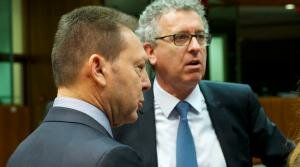- ECOFINEconomic & Financial Affairs (ECOFIN)
ECOFIN Council: Presidency gets updated mandate for negotiations on the SRM Regulation
Today, the ECOFIN Council gave the Presidency an updated mandate to negotiate with the European Parliament on a Regulation for a Single Resolution Mechanism for banks (SRM).
The Presidency has put this issue on the top of its agenda as a key priority file.
At the same time, the general approach of December initiated an intergovernmental conference to draw up an intergovernmental agreement on the Single Resolution Fund and this process has been moving in parallel with the Presidency’s negotiations on the SRM with the Parliament. Τhe two processes are interlinked and complementary.
Today (11.3.2014), the Presidency submitted to the Council proposals as a basis for discussion on what it has identified as key issues that could facilitate reaching a common understanding with the Parliament.
These proposals included the following issues:
(A) which institution will be the ultimate resolution authority, the so called "Meroni institution"
(B) Who will determine whether an institution is failing or likely to fail,
(C) What types of decisions should be taken by the Plenary session of the Board and which by the Executive, in any individual resolution
(D) The voting regime in the Plenary session of the Board,
(E) The loan facility (credit line) to the Single Resolution Fund, and finally,
(F) The contributions to the SR Fund.
Today's discussions in the Council on all these issues were extensive and very constructive and arrived at a new updated mandate of the Council to the Presidency, allowing the necessary flexibility in the negotiations with the Parliament.
ECOFIN President Yannis Stournaras decided to lead these negotiations and invited the Chair of the IGC process, Dutch Finance Minister Jeroen Dijsselbloem, to join him, thereby highlighting that the Council is united and that both processes are going in the same direction.
During the working breakfast, the Council welcomed the two new Ministers of Finance, Pier Carlo Padoan for Italy, and Andrej Babis for the Czech Republic. The usual debrief on the Eurogroup and the economic situation followed on the basis of the Commission’s winter forecast. The Commission presented also its main findings of its in-depth reviews on macroeconomic imbalances in 17 member states. Furthermore, Finance Ministers were informed of the economic and financial aspects of developments regarding Ukraine.
Moreover, Ministers were debriefed by the Presidency and the Commission on the discussions and outcome of the G20 Finance Ministers and Central Bank Governors meeting held in Sydney on 22 and 23 February. Discussions at the meeting had focused on the global economy, economic growth, investment in infrastructure and SMEs, IMF reform, financial regulation and tax transparency. G20 Finance Ministers endorsed a Common Reporting Standard developed by the OECD for the automatic exchange of information on taxation issues.
On the basis of a Presidency issue-paper and a communication from the Commission, the Council held an exchange of views on the economic aspects of the EU’s 2030 energy and climate framework, in preparation of the European Council meeting on 20-21 March. More specifically, discussions focused on the actions to be undertaken by member states to achieve the policy targets, the means for promoting renewable energy, measures for addressing the energy price gap with the EU’s economic competitors and the completion of the internal energy market, as well as the impact of the proposed framework on growth and employment, industrial competitiveness and public finances.
Regarding the agenda issue of the adoption of an amended Savings Taxation Directive, ECOFIN President Yannis Stournaras concluded the outcome of the Council’s discussion as follows: “On the Savings Taxation Directive, I would like to highlight that this has been a priority of the Hellenic Presidency, as it is an important tool in the fight against tax fraud and tax evasion. In this regard, I am pleased to announce that today, thanks also to the constructive approach of our partners, we made a substantial step forward in that there was unanimous agreement that the formal adoption of the Directive will take place at the next Council formation meeting, following the confirmation of this political agreement at the March European Council, in line with the mandate and timetable foreseen by our Heads of State and government.”
Furthermore, under “other business”, the Council took note of on-going work on financial services dossiers.
In the margins of the ECOFIN, a Macroeconomic Dialogue at political level took place on Monday. There was a constructive exchange of views between social partners (employers and trade unions at EU level, as well as representatives of public enterprises and SMEs). The discussion focused on two issues: a) the appropriate policy responses conducive to sustained economic growth, given the positive economic outlook, following a long period of contraction in economic activity and b) the key funding channels that would help restoring lending to the real economy and particularly increasing the volume of credit available for SMEs in the short to medium term.
Related Documents
Related Photos
Related Videos










